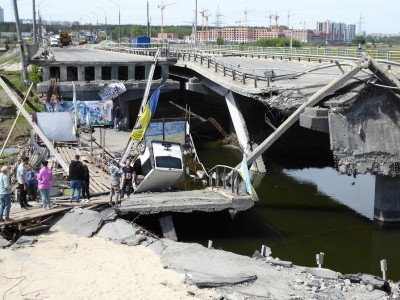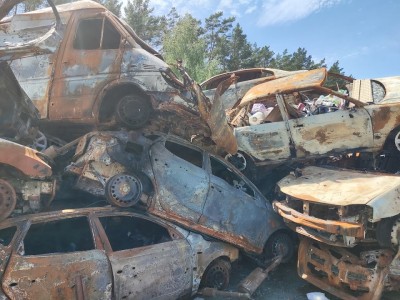"The worst and the best of humanity"
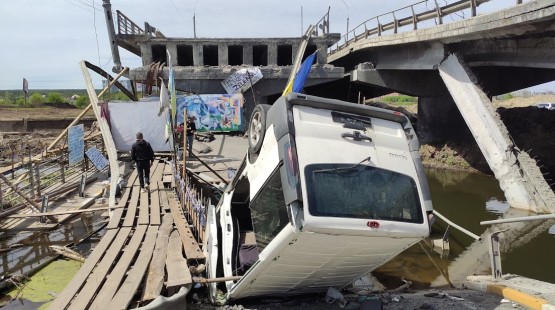
"Home for three days now and people ask me, how I am doing. There is no simple answer. Such a mixture of memories, emotions and thoughts. Ultimately, I'm sitting at home; in safety. All of those people I met do not have even that. As I write, the app on my phone pings again to tell me there is another air raid warning in Lviv."
Our Director of Operations, David James, travelled to Ukraine a few days back. Do not miss his reflection after a moving visit.
The worst and the best of humanity
Man’s Inhumanity to Man
The war is a graphic illustration of man’s inhumanity to man. Death, destruction, misery and chaos. In only a few days, I was able to form my own impressions, but also see the tremendous human response, especially in the outpouring of love by the church.
The Journey to Ukraine
The trains on the 15-hour journey from Villach to the Polish/Ukraine border were not busy. Until Krakow. Suddenly, everyone was caught up by the mass movement of Ukrainians wanting to return to their homeland; luggage racks were packed, people stood in the corridors, sat on their cases or with cases on their laps.
I befriended a mother and her teenage daughter who were on their way home from Bratislava. Three months in a strange culture was enough and they longed to return. Their city, 3 hours West of Kiev, now seemed safe enough. Their story was echoed along the whole length of the train.
Knowing that we would be passing by their home the following morning, I checked with Roman in Lviv and offered them a ride in the minibus with Stepan and myself to Lviv, a place to stay in the New Hope Centre that night, and a ride home the next day. They quickly and gratefully accepted. On the one hand I was happy to be able to help. On the other it was shocking that this woman had naively and without question accepted a lift in a van with two strange men. How easy it must be for human traffickers.
The direct route from the railway station at Przemysl to Lviv is is about 80km. Ridiculously long queues mean that Stepan takes the long way round, to a much quieter border crossing. Four hours and almost 200 winding kilometres later we arrive in Lviv and run the gauntlet of military check points, explaining why we were out 3 hours after the 11pm curfew.
The Road to Kiev
The following day we leave at 6am, heading towards Kiev. Passing through 500km of agricultural plains, it is easy to understand why Ukraine is called the breadbasket of Europe. Time to reflect on the almost certain world food crisis that is a consequence of the war.
As we pass the cities of Rivne and Zhytomyr and get closer to Kiev the military checkpoints become more frequent. Suddenly a petrol station with a huge line of cars; they have fuel. Most have run dry.
Further signs of war fill the last 40km of the main road into Kiev. Factories, warehouses and retail outlets have all been damaged by seemingly indiscriminate rocket fire. We pass a destroyed tank, parked in front of a tractor dealership. Surreal. Now we see damaged homes too.
Finally, we turn north to Irpin a suburb of Kiev. Private homes also destroyed. Were the residents able to escape?
The Bridge at Irpin
The bridge over the Irpin river was one of the lasting images at the start of this war. Destroyed by the Ukrainian army to prevent the Russian army entering Kiev, there was a battle on the bridge and the surrounding area. Residents fled over quickly constructed wooden walkways under the collapsed concrete. Many been carried in wheelchairs or in makeshift stretchers. It is sobering to stand and take in the enormity of what happened here; 29 people lost their lives in the battle.
Nearby a car park with the wreckage of over 100 vehicles; blown up, shot up or burned up in the battle. Family saloons raked with bullet holes - the size of my thumb. A car like my own opened like a tin can by a direct hit from a rocket. A bus burned to just a frame. We are told there are two other similar car parks in Irpin, where other vehicles have been moved.
The Church at Irpin
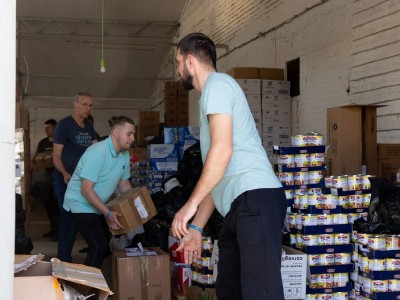 The Irpin Bible Church is making a massive impact in the community. Volunteers go out from the church each day to help people repair their damaged roofs and put polythene sheeting over blown out windows. Others hand out food parcels or serve hot meals. Kids play in the grounds, trying to snatch back a piece of normality.
The Irpin Bible Church is making a massive impact in the community. Volunteers go out from the church each day to help people repair their damaged roofs and put polythene sheeting over blown out windows. Others hand out food parcels or serve hot meals. Kids play in the grounds, trying to snatch back a piece of normality.
Stanislav, an ECM Associate, is not in Irpin today; he is taking a needed break in his hometown. The work is so intense, people coming with needs and requests all day long. We speak to two co-pastors. They used to have three Sunday services with a total of 1000 people attending. Now it is just one service of 250, an indication of how many people have fled west. However, 40% of the congregants are new people from the community, searching for answers in the church that has demonstrated Christ’s love to them. Many people come daily to pray for each other and to pray for Ukraine.
We deliver our van load of food packages to their small warehouse. Everything unloaded in a few minutes – how often had volunteers formed human chains like this? Some of the food supplies and clothes will be transported further east, to areas of the country that had suffered far greater damage.
Many people giving selflessly each day.
Life in Lviv
We arrive back in Lviv just as the curfew is starting for the night and, as we turn the last corner, the air raid sirens start howling. My companions do not seem too concerned and we discuss whether I would be safe in my hotel room. Most likely. 45 minutes later the all-clear sounds.
The next day when I am in the New Hope Centre, the air raid sirens sound again. Remembering how relaxed everyone was the evening before, I continue to prepare my sermon for Sunday. Gradually I realise the rest of the ground floor is quiet, so I investigate; everyone has gone down to the basement shelter – I guess attitudes to safety vary according to how tired you are! In the basement I sit for two hours with some of the team plus 40 or so neighbours who have joined us.
In total I heard the air raid sirens five times. The noise added to by the collective groans when they first sound.
As I walk around the city, life goes on, people shop and enjoy a coffee, kids kick a ball in the park, families stroll around the city centre – its beauty somewhat tainted by chipboard covering stained glass windows and walls of sandbags in front of prominent buildings.
The Church in Lviv
As well as being a transit camp for displaced people, a distribution point for food and other supplies, the New Hope Centre is also home to a vibrant church. I have the privilege to attend the young adult Bible study and a teenager event. I hear about the amazing kid’s ministry.
I have been asked to preach. How should I apply the Word of God into a situation that I know so little about? I have never been so mindful of the congregation as I prepared. With Roman translating I seek to unpack some of the truths around the theology of suffering. I am grateful when people come and thank me afterwards.
But as we chat over coffee, I am again conscious of who I might be talking to? People who have been bereaved, who have lost their home or who are living in fear and despair.
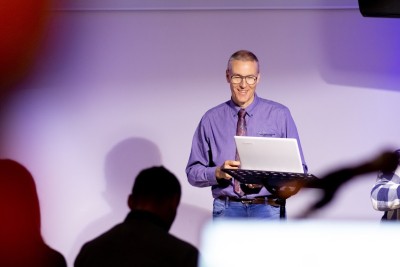
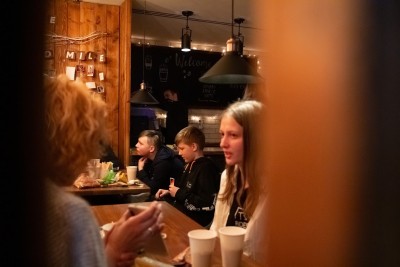
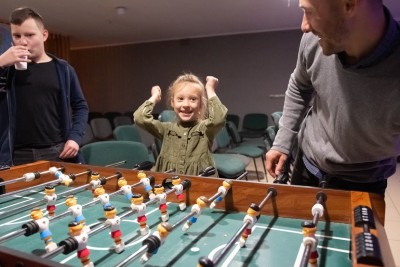
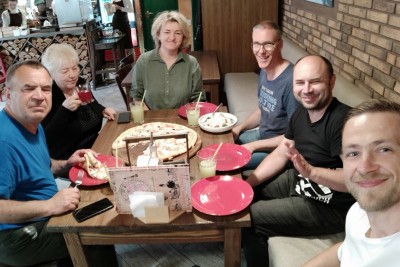
Time for Reflection
Home for three days now and people ask me, how I am doing. There is no simple answer. Such a mixture of memories, emotions and thoughts. Ultimately, I'm sitting at home; in safety. All of those people I met do not have even that. As I write, the app on my phone pings again to tell me there is another air raid warning in Lviv.


